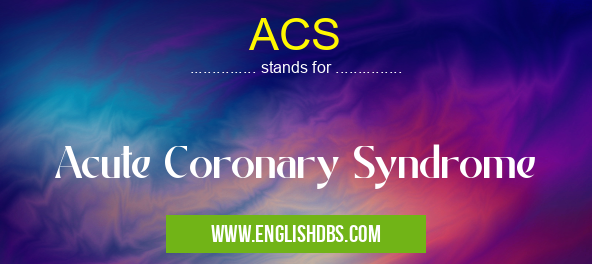What does ACS mean in CARDIOLOGY
Acute Coronary Syndrome (ACS) is a term used to describe a number of medical conditions that affect the heart. It is an umbrella term used to refer to a variety of chest pain and discomfort caused by temporary blockages in the blood supply to the heart. ACS can lead to serious complications, including death, if not recognized and treated quickly. It is important to understand what ACS is and how it can be treated in order to properly diagnose and treat this potentially life-threatening condition.

ACS meaning in Cardiology in Medical
ACS mostly used in an acronym Cardiology in Category Medical that means Acute Coronary Syndrome
Shorthand: ACS,
Full Form: Acute Coronary Syndrome
For more information of "Acute Coronary Syndrome", see the section below.
» Medical » Cardiology
Common Symptoms of ACS
The most common symptom of Acute Coronary Syndrome is chest pain or discomfort, usually accompanied by shortness of breath, sweating, nausea, fatigue or lightheadedness. The severity and type of chest pain may vary depending on the underlying cause. Other symptoms may include dizziness, palpitations, arm/shoulder pain or jaw pain. Any combination of these symptoms should be immediately evaluated by a healthcare professional.
Diagnosis
The diagnosis of Acute Coronary Syndrome can be made based on history taking and physical exam findings as well as laboratory tests such as ECG (electrocardiogram), echocardiography (ultrasound), cardiac biomarkers (troponin levels), exercise stress test (treadmill testing) CT scan (angiography) or MRI/MRA techniques. The treatment options will depend on the diagnosis made after evaluation by your healthcare team.
Treatment Options
Treatment options for Acute Coronary Syndrome may include lifestyle modifications such as quitting smoking, reducing stress levels and increasing physical activity as well as medications such as aspirin, statins, beta blockers or anticoagulants. In some cases surgery may also be required if there are severe blockages in the coronary artery that cannot be resolved with medications alone.
Essential Questions and Answers on Acute Coronary Syndrome in "MEDICAL»CARDIOLOGY"
What is acute coronary syndrome?
Acute Coronary Syndrome (ACS) is a term used to describe a group of symptoms caused by decreased blood flow to the heart. It may manifest in various forms such as chest pain, shortness of breath, lightheadedness, and an irregular heartbeat. ACS is often caused by plaque build-up in the coronary arteries that narrows or blocks them over time.
Who is at risk for acute coronary syndrome?
Anyone can develop ACS, but certain factors can put individuals at higher risk. These include high cholesterol levels, high blood pressure, diabetes, obesity, lack of exercise, smoking, heavy alcohol use, family history of cardiovascular diseases and older age.
What are the common signs and symptoms associated with acute coronary syndrome?
The most common symptom of ACS is chest pain that can be felt as pressure or tightness in the chest that radiates down one or both arms. Other associated symptoms include shortness of breath, nausea/vomiting, dizziness/lightheadedness and profuse sweating.
Does everyone who experiences these symptoms have ACS?
Not necessarily – many other conditions such as gastritis or pneumonia can also lead to severe chest pain and other related symptoms. Therefore it is important to consult your doctor for an accurate diagnosis if you experience these symptoms.
How is acute coronary syndrome diagnosed?
Diagnosis usually begins with a physical examination where your doctor will ask about your medical history and check your vital signs for any abnormalities. For further confirmation of diagnosis, a range of medical tests are usually conducted including an electrocardiogram (ECG), echocardiogram (ultrasound scan), exercise treadmill test or cardiac catheterization (angiography).
How should acute coronary syndrome be treated?
Treatment may involve lifestyle changes such as adopting healthier diet habits and exercising regularly in order to reduce risk factors associated with ACS as well as medications such aspirin and statins for reducing cholesterol levels. In more severe cases where blockages are present in the coronary arteries stent insertion procedure may be recommended by the doctor in order to open up the affected vessels again.
How long does it take to recover from an acute coronary syndrome event?
Recovery time varies between individuals depending on severity of condition and type of treatment required – typically full recovery typically takes around 6- 8 weeks following treatment however more severe cases may require longer recovery times extending up to several months.
Final Words:
Acute Coronary Syndrome is a group of medical conditions characterized by sudden chest pain and discomfort typically caused by reduced blood flow to the heart muscle due to an obstruction in one of its vessels. Diagnosis must involve taking into consideration history taking results along with physical examination findings combined with laboratory tests such as ECG’s before treatment can begin which may include lifestyle changes combined with medications depending on severity or if other treatments are indicated such as surgery.
ACS also stands for: |
|
| All stands for ACS |
